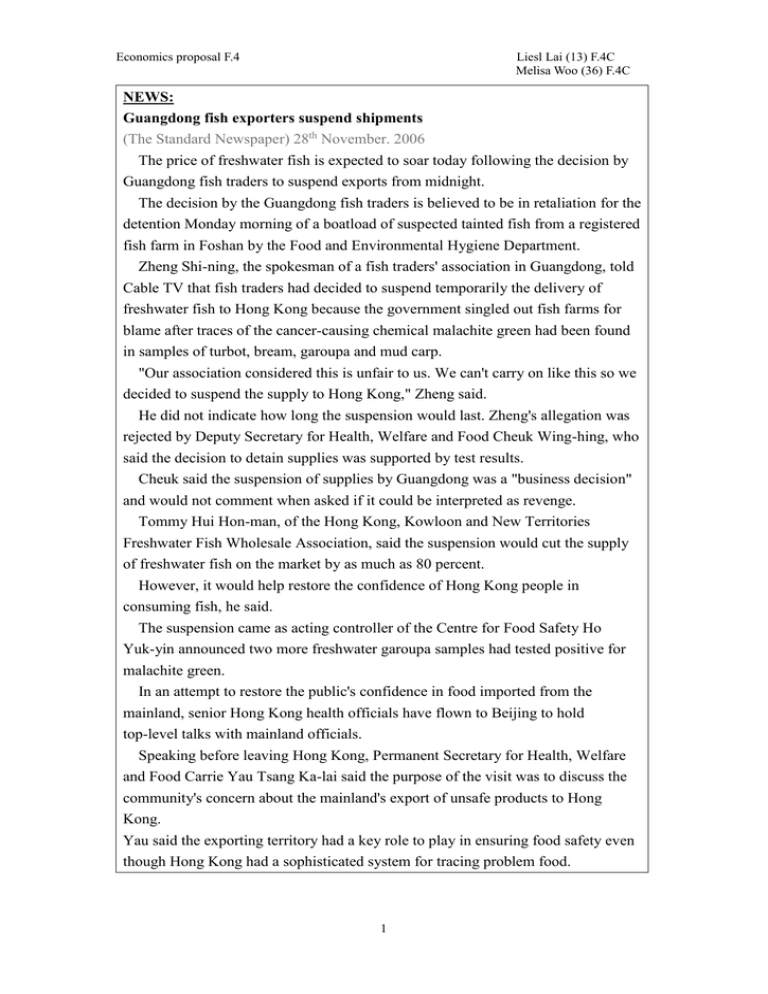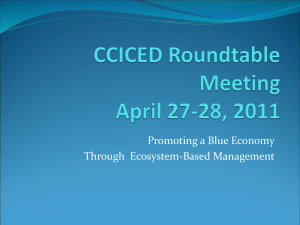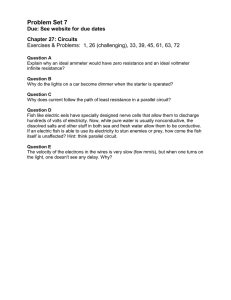Lisel
advertisement

Economics proposal F.4 Liesl Lai (13) F.4C Melisa Woo (36) F.4C NEWS: Guangdong fish exporters suspend shipments (The Standard Newspaper) 28th November. 2006 The price of freshwater fish is expected to soar today following the decision by Guangdong fish traders to suspend exports from midnight. The decision by the Guangdong fish traders is believed to be in retaliation for the detention Monday morning of a boatload of suspected tainted fish from a registered fish farm in Foshan by the Food and Environmental Hygiene Department. Zheng Shi-ning, the spokesman of a fish traders' association in Guangdong, told Cable TV that fish traders had decided to suspend temporarily the delivery of freshwater fish to Hong Kong because the government singled out fish farms for blame after traces of the cancer-causing chemical malachite green had been found in samples of turbot, bream, garoupa and mud carp. "Our association considered this is unfair to us. We can't carry on like this so we decided to suspend the supply to Hong Kong," Zheng said. He did not indicate how long the suspension would last. Zheng's allegation was rejected by Deputy Secretary for Health, Welfare and Food Cheuk Wing-hing, who said the decision to detain supplies was supported by test results. Cheuk said the suspension of supplies by Guangdong was a "business decision" and would not comment when asked if it could be interpreted as revenge. Tommy Hui Hon-man, of the Hong Kong, Kowloon and New Territories Freshwater Fish Wholesale Association, said the suspension would cut the supply of freshwater fish on the market by as much as 80 percent. However, it would help restore the confidence of Hong Kong people in consuming fish, he said. The suspension came as acting controller of the Centre for Food Safety Ho Yuk-yin announced two more freshwater garoupa samples had tested positive for malachite green. In an attempt to restore the public's confidence in food imported from the mainland, senior Hong Kong health officials have flown to Beijing to hold top-level talks with mainland officials. Speaking before leaving Hong Kong, Permanent Secretary for Health, Welfare and Food Carrie Yau Tsang Ka-lai said the purpose of the visit was to discuss the community's concern about the mainland's export of unsafe products to Hong Kong. Yau said the exporting territory had a key role to play in ensuring food safety even though Hong Kong had a sophisticated system for tracing problem food. 1 Economics proposal F.4 Liesl Lai (13) F.4C Melisa Woo (36) F.4C Description of the Issue: As there are traces of the cancer-causing chemical malachite green had been found in samples of turbot, bream, garoupa and mud carp, Hong Kong government singled out some fish farms in mainland China which is suspected to be using the carcinogenic chemicals to the fish. Guangdong fish traders thought the act of the Hong Kong government was too harsh and unfair to them, so they decided to suspend the delivery of exports of freshwater fish to Hong Kong. Explaining the Issue: The original demand and supply diagram before the suspension of fish export and discovery about the carcinogenic chemical in the fish: Price of fish / $ Pe Qe Before the suspension of exports of some kinds of freshwater fish (e.g. turbot, bream, garoupa and mud carp) and the discovery of the banned carcinogenic chemical in the fish, the market price of the fish is in equilibrium level. Quantity demanded is equal to quantity supply. The price of the fish has no tendency to change as there is no excess of demand and supply. 2 Economics proposal F.4 Liesl Lai (13) F.4C Melisa Woo (36) F.4C Price of fish D2 D1 S2 S1 P2 P1 0 Quantity of fish Q2 Q1 After the suspension of exports of some kinds of freshwater fish (e.g. turbot, bream, garoupa and mud carp) and the discovery of the banned carcinogenic chemical in the fish, the supply of the freshwater fish decreases sharply for 80% because the fishermen are taking revenge on Hong Kong government and suspended the export of freshwater fish to Hong Kong. Therefore, the supply of freshwater fish in Hong Kong decreases sharply, and the supply curve shifts to the left. Citizens in Hong Kong are afraid of the carcinogenic chemicals remain in the freshwater fish body would affect their health and cause cancer. Therefore, they demand less freshwater fish and demand curve also shifts left. The shift of supply is much greater than the shift of demand curve as the supply of freshwater fish is nearly zero but there are still some Hong Kong citizens buy fish. To conclude, the market price of freshwater fish soars but the quantity transacted decreases. 3



